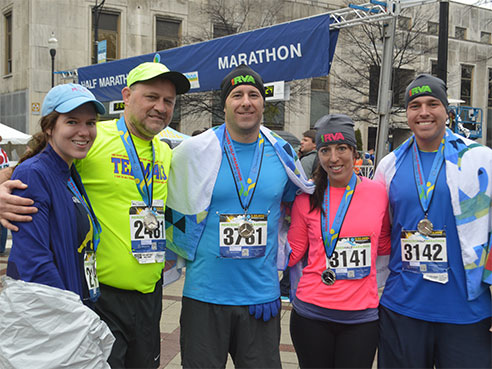 Members of UAB's orthopedic spine surgery team at the Mercedes Marathon with patient Kelly Garner. Micah Counts, RN, Garner, William Neway, D.O, Emily Keener, D.O. and Steven Keener.There are a lot of important, unforgettable dates in any life: birthdays, wedding day or the birth of a child. One date that stands out for Kelly Garner is Jan. 28, 2014.
Members of UAB's orthopedic spine surgery team at the Mercedes Marathon with patient Kelly Garner. Micah Counts, RN, Garner, William Neway, D.O, Emily Keener, D.O. and Steven Keener.There are a lot of important, unforgettable dates in any life: birthdays, wedding day or the birth of a child. One date that stands out for Kelly Garner is Jan. 28, 2014. That’s the date of Snowmageddon, a paralyzing snowstorm in Birmingham, Alabama. Garner spent the day as a Good Samaritan, helping stranded motorists. He spent the night lying in the freezing snow after tumbling 40 feet down a ravine while trying to make it home. Rescuers found him in the morning, amazed that he had survived the fall and the nearly 12 hours spent injured and unable to move in the long, cold night.
A second key date for Garner was two weeks later, Feb. 16, 2014. Garner was in his intensive-care room at the University of Alabama at Birmingham Hospital, recovering from multiple surgeries to repair injuries to his head, neck, spine and ribs. The television was on, and Garner watched coverage of the Mercedes Marathon, a major Alabama running event. On that day, Garner made a vow.
| “There were a lot of people who didn’t think I’d ever walk again. But while watching the race on TV, I decided that, next year, I’d be there. I’d be running.” |
That brings us to the next important date, Feb. 22, 2015. – the date of the next Mercedes Marathon. Garner fulfilled his vow. He was there, wearing bib number 2481, running the half-marathon.
At his side were members of his UAB spine surgery team. Two of his physicians, William Neway, III, D.O., and Emily Keener, D.O., along with registered nurse Micah Counts, ran with Kelly, while clinical coordinator Eiryn Mortellaro, R.N., and administrative assistant Julie Foster were on hand to cheer him on.
By March 2014, following his release from UAB, Garner was hard at rehab, walking tirelessly in his neighborhood. By August, he was running. He worked with a running coach, Danny Haralson, a certified coach with The Road Runners Club of America. Haralson has mentored thousands of runners, and he had Garner go easy at first, and build up slowly. Garner’s medical team monitored his progress.
“I had an X-ray on Jan. 27 – ironically, one day shy of the anniversary of my injury,” Garner said. “They said I was good to go. Dr. Neway and Dr. Keener are both runners, as are some of their staff, and they asked if I’d mind if they ran with me. Of course I said I’d love to have them join me. It meant the world to me to have them at my side.”
“We were incredibly honored to run with Kelly in the Mercedes half-marathon,” said Neway, an assistant professor of orthopedic surgery at UAB. “By completing the half-marathon, he has done what many people will never do, especially just one year from surviving hypothermia, hypoglycemia, a spine fracture and surgery. He has shown incredible determination and perseverance and is a great inspiration to us all.”
Garner had run some 5Ks and 10Ks and had run the equivalent of a half-marathon a few times in practice. He averaged about 25 miles per week during training. And at his first official half-marathon, he finished in the middle of the pack, with a respectable time of 2:39:02. After what Garner has been through, just finishing the race made him a champion.
“I wasn’t trying to win; my goal was to finish, to show myself that I could do it,” Garner said. “Being able to run a race like this implies a level of independence, a sense that I can do things for myself, by myself. That’s been one of my goals all along.”